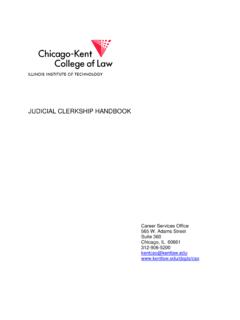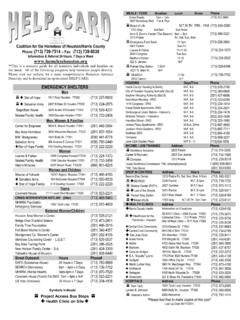Transcription of Healthcare Workers’ Religious Objections to Mandatory ...
1 1 Healthcare Workers Religious Objections to Mandatory influenza Vaccination: examining title VII s Religious Accommodation Requirement INTRODUCTION influenza is a contagious virus that can cause mild to severe respiratory illness and, at times, result in Healthcare personnel infected with influenza working in hospitals and other Healthcare facilities can transmit the virus to coworkers and to patients who are more susceptible to risks of severe complications from the Experts agree that vaccination of Healthcare personnel is the best method to reduce influenza infection and prevent mortality in However, because a significant portion of the Healthcare workforce has continued to be unvaccinated.
2 Outbreaks of nosocomial (hospital-acquired) influenza4 have occurred for decades throughout the United Since 1981, the Centers for Disease Control and Prevention (CDC) have recommended that all Healthcare personnel receive an annual influenza vaccination to protect themselves and vulnerable As part of the Healthy People program, the Department of Health and Human Services (HHS) has set a goal of increasing the percentage of Healthcare personnel who 1 Seasonal influenza : Flu Basics, CENTERS FOR DISEASE CONTROL AND PREVENTION (Sept. 12, 2013), [hereinafter Flu Basics]. 2 People at High Risk of Developing Flu-Related Complications, CENTERS FOR DISEASE CONTROL AND PREVENTION (Sept.)
3 18, 2013), [hereinafter People at High Risk]. 3 Information for Healthcare Professionals, NAT'L ADULT AND influenza IMMUNIZATION SUMMIT (Oct. 4, 2012), 4 A nosocomial infection--also called hospital acquired infection can be defined as: An infection occurring in a patient in a hospital or other health care facility in whom the infection was not present or incubating at the time of admission. This includes infections acquired in the hospital but appearing after discharge, and also occupational infections among staff of the facility. Prevention of Hospital-Acquired Infections: A Practical Guide (2nd Edition), WORLD HEALTH ORG. (2002), [hereinafter Prevention of Hospital-Acquired Infections].
4 5 Call to Action: influenza Immunization Among Health Care Personnel, NAT'L FOUND. FOR INFECTIOUS DISEASES (2008), [hereinafter Call to Action]. 6 influenza Vaccine 1980-1981: Recommendation of the Public Health Service Immunization Practices Advisory Committee, 93 ANN. INTERN. MED. 466, 466-68 (1980) [hereinafter influenza Vaccine 1980-1981]. 2 are vaccinated annually against seasonal influenza to 90 percent by However, as of 2008, only percent of Healthcare personnel received the influenza By the 2011-12 influenza season, uptake of the influenza vaccine among Healthcare personnel increased to an estimated 67 Because the vaccination rate among Healthcare personnel remained well below recommended levels, Healthcare employers began to develop voluntary vaccination programs and incentive programs in order to encourage increased uptake among their personnel.
5 In 2005, Virginia Mason Hospital became the first non-profit hospital to implement a 100 percent staff influenza immunization goal and a fitness for duty requirement as an important patient safety effort to save lives. 10 Since then, hundreds of Healthcare facilities across the country have implemented Mandatory influenza vaccination programs, attaining coverage levels of up to 99 States have also recognized the need to increase influenza vaccination rates among Healthcare personnel. As of the summer of 2011, twenty states have developed legislation or regulations requiring certain Healthcare employers to implement influenza vaccination requirements for identified categories of Healthcare influenza vaccination programs and policies generally exempt those Healthcare personnel who have a documented medical contraindication and sometimes also explicitly exempt those 7 Immunization and Infectious Diseases, (Aug.)
6 28, 2013), 8 Id. 9 influenza Vaccination Coverage Among Health-Care Personnel 2011-12 influenza Season, United States, CENTERS FOR DISEASE CONTROL AND PREVENTION (Sept. 28, 2012), [hereinafter influenza Vaccination Coverage Among Health-Care Personnel]. 10 Medical Firsts, VIRGINIA MASON MEDICAL CENTER (2013), 11 Lynne V. Karanfil et al., Championing Patient Safety through Mandatory influenza Vaccination for All Healthcare Personnel and Affiliated Physicians, 32 INFECT. CONTROL HOSP. EPIDEMIOL. 375 79 (2011); Honor Roll for Patient Safety: Recognizing Outstanding Vaccination Efforts in Healthcare Settings, IMMUNIZATION ACTION COALITION (2013), 12 Alexandra Stewart & Marisa Cox, influenza Vaccination of the Health Care Workforce: Developing a Model State Law, DEP'T OF HEALTH POLICY, GEORGE WASHINGTON U.
7 SCHOOL OF PUB. HEALTH AND HEALTH SERVICES (2011), 3 who hold a bona fide Religious belief against receiving the vaccination. Workers who receive an exemption are typically required by their employer to wear a face mask during the entirety of the influenza season. However, Healthcare personnel are not always pleased with this solution. influenza vaccination mandates implicate a variety of legal issues. Individual Healthcare workers with Religious Objections to vaccination may choose to bring title VII Religious accommodation claims against their employers if an adverse employment action has been taken against them for refusing to comply with a Mandatory influenza vaccination policy.
8 Despite the controversy generated by such policies and the fact that dozens of Healthcare workers have been terminated for refusing to comply, no court has yet issued an opinion applying title VII Religious accommodation law to a case involving a Healthcare worker s refusal of an influenza vaccination. In this article, I will delve into the issues surrounding title VII Religious accommodation claims brought by individual Healthcare employees with Religious Objections to vaccination. In Part I, I will discuss the science and history of influenza vaccination and efforts to increase uptake. In Part II, I will analyze and discuss Religious Objections to vaccination and Religious accommodation law as interpreted by the Supreme Court and lower courts.
9 I will also discuss the ethical obligations of Healthcare workers. Finally, in Part III, I will discuss how title VII should be applied in such cases and how conflicts between Religious beliefs and professional obligations should be handled. I will argue that Healthcare facilities with Mandatory influenza vaccination policies that require those who are exempted to wear a face mask will most likely not and should not be at risk of liability under title VII. I will also argue that, because accommodating a Healthcare worker s Religious objection to vaccination by exempting him or her from an influenza vaccination requirement and instead requiring him or her to wear a face mask imposes an undue hardship on the employer, Healthcare facilities with no Religious exemptions to their 4 Mandatory influenza vaccination policies will most likely not and should not be at risk of liability under title VII.
10 Finally, I will contend that, if an individual s Religious views prevent him or her from receiving an influenza vaccination, he or she cannot sincerely swear to live up to the standards required by Healthcare professions codes of ethics and should therefore not enter a Healthcare profession. I. The History of influenza Vaccination and Efforts to Increase Uptake A. The Science 1. The Scope of the Problem influenza is a contagious virus that can cause mild to severe respiratory illness and, at times, result in Most experts think that influenza spreads primarily in an airborne manner by droplets made when people with the virus cough, sneeze, or talk.






